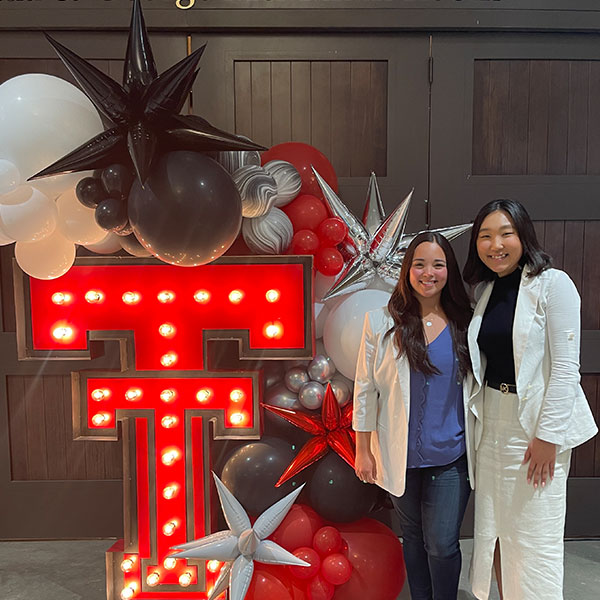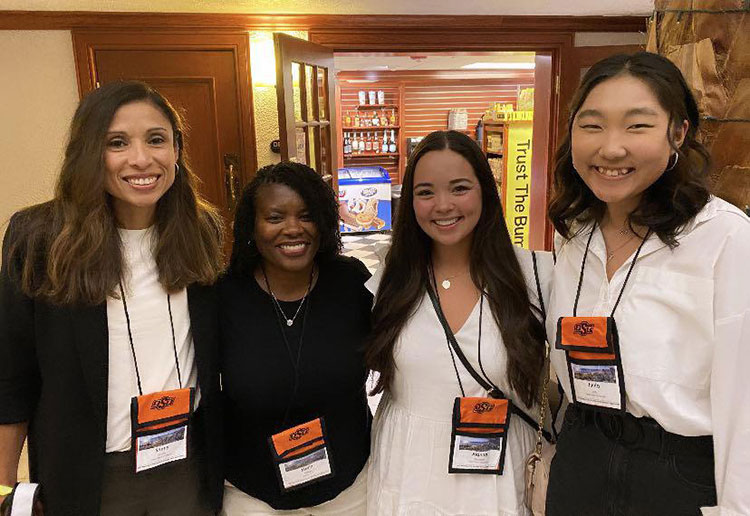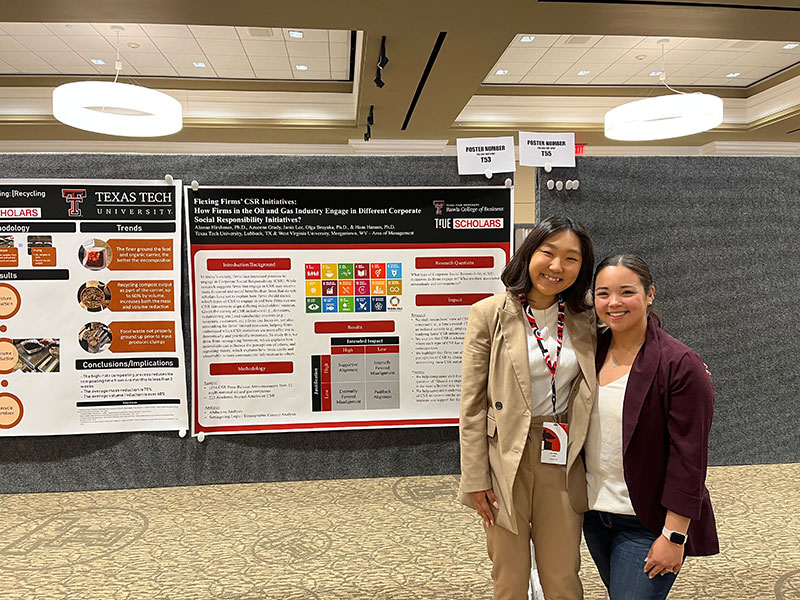
As Junia Lee prepares to graduate with her bachelor's degree in management , her attention turns towards applying for doctoral programs.
However, research in business was not on Lee's radar when she started at the Jerry S. Rawls College of Business . She was familiar with what research looked like for the hard sciences - along with being a management major and minoring in biology and health professions, Lee was also once a pre-medicine student - but the idea of research in business was completely foreign to Lee.
"From an undergraduate perspective, research in business is very scarce," said Lee. "The opportunities are not really made known to students. What we know and are encouraged to do, instead, is to apply business skills to an internship and then go to the career fair to secure a job."
All that changed when Lee, about to enter her junior year, decided to participate in the Rawls Undergraduate Research Program and was paired with Alanna Hirshman , assistant professor of management.
For the next two years, Lee and Hirshman would develop a strong mentor-mentee relationship that would transform the way they see their role as researchers.
A Mentorship Built on Research
The Rawls Undergraduate Research Program started in fall 2021 and gives undergraduate students the opportunity to participate in faculty-mentored research at Rawls College.
"The Rawls Undergraduate Research Program is a wonderful opportunity that allows faculty to propose a paper idea and find a student interested in that idea," said Hirshman. "It's an opportunity to help an undergraduate student interested in research develop and hone their research skills. You can show them what life in graduate school, and potentially as an academic, can look like."
The project that Hirshman proposed was focused on analyzing how firms in the oil and gas industry engage in corporate social responsibility (CSR) initiatives.
"This is a qualitative piece of research," said Hirshman. "I hoped to recruit an undergraduate student to help me go through several CSR initiatives and really explore what's there."
When reviewing all the applications, Lee's resume immediately stood out to Hirshman because of all the extracurricular activities that were listed.
"I knew if someone could manage all of the activities Junia was engaged in while maintaining good grades, she had to have great time management skills," said Hirshman.
Soon after, Lee and Hirshman were paired together.
"While the Rawls Undergraduate Research Program is typically a year, it can take some time to train an undergraduate student, or even a graduate student for that matter," said Hirshman. "Considering Junia was a junior at that time, I thought this could be a good opportunity to establish a relationship that could grow beyond the one-year mentorship."
Lee quickly warmed to Hirshman as a mentor and researcher.
"Alanna has been really patient with me throughout this whole process and program," said Lee. "I came in knowing nothing, but I noticed very early on it's quite impressive when you can take scholarly language and translate that for a novice or the general public. She has been very supportive in making sure that I was understanding the research process and the opportunities in academia. In short, Alanna is consistently a role model and an inspiration to me."
A big component of the early days of their mentor-mentee relationship was Hirshman introducing Lee to the language and literature of management research.
"There's a learning curve to research," said Hirshman. "I remember meeting with Junia and telling her that reading academic literature was going to be like reading a new language. I encouraged her to come to me with any questions. Part of this whole process of research is learning a new language."
By establishing a strong foundation in the fundamentals of research and academic language, Lee and Hirshman were able to quickly build the trust needed to make the most of the Rawls Undergraduate Research Program.
Growing as Researchers

Before teaming up with Hirshman, Lee was only familiar with web-based coding languages like HTML or Python and thought that research with Hirshman would rely on such knowledge. However, Lee was able to learn and gain exposure to different kinds of research and data coding, allowing her to grow her research skills.
Hirshman was able to see that Lee was a quick learner.
"One of the coolest things has been seeing Junia's growth as an individual," said Hirshman. "All of her research and data coding, I was very impressed with."
Lee's eye for detail and ability to dive into data coding gave Hirshman the confidence to rely on Lee more as a junior scholar than simply an undergraduate student.
This was especially important when Hirshman and her co-researchers had a revise-and-resubmit for an article. Revise-and-resubmits happen when an editor and expert reviewers at a journal like an idea behind an article but suggest edits the researchers should make before further consideration.
With a quick turnaround time and some data to code, Hirshman leaned on Lee to get a portion of the work done.
"I asked Junia to code some data in about a week, which was already a quick turnaround request," said Hirshman. "But she got it done in three or four days! Having that kind of support from her has been awesome."
As Lee continued to grow as a researcher, so, too, did Hirshman.
"I've learned to better understand how and when it's appropriate to delegate," said Hirshman. "I tend to be someone who wants to do a lot, but I've learned that research is a balance between efficiency and effectiveness."
With the first year of the program done, Hirshman and Lee decided to continue working together for a second year.
Committing to Research
Lee had seen so much growth within herself as a researcher, but getting her Ph.D. was still more of a curiosity than a goal.
Hirshman encouraged Lee to attend the Southern Management Association Conference to really explore graduate school and the possibility of research as a career.
"There's a pre-doctoral consortium where students who are considering Ph.D. programs can hear from Ph.D. students and faculty from different universities," said Hirshman. "It's an awesome opportunity to get a peek of graduate school and what it's like to go to an academic conference."

"Going to the conference, I stepped in, and it was like a family reunion," said Lee. "Everyone was hugging each other and talking about their lives. Research was obviously talked about in presentations and seminars, but the biggest things were the relationships and network you build. I think the number one thing about research is building your support system and making sure you're in a group that will help you develop your ideas and curiosity."
After the conference, Hirshman tasked Lee with going out and finding research topics. Lee needed to find the area of research she was interested in.
Lee now hopes to study parts of corporate political activity and how external stakeholders can influence businesses' decisions, especially from a strategic perspective. She hopes to incorporate what she has learned through the Rawls Undergraduate Research Program and apply them to more cross-disciplined studies, gathering data from public policy and healthcare.
"It's been awesome to see Junia grow from asking 'What is corporate social responsibility?' to understanding the literature, working on the data, and now finding topics beyond what we're already doing," said Hirshman.
Research. Built on Rawls.
As Lee and Hirshman prepare to wrap up their second and final year together in the Rawls Undergraduate Research Program, they are quick to reflect on their time in the program with fondness and gratitude.
"I strongly encourage faculty to participate in the program," said Hirshman. "Over the last year-and-a-half, I've built a positive relationship with Junia as a scholar. While I was thankful that my co-authors and I had somebody to help us move our project forward, I also received the internal gratification of watching someone else grow."
"The Rawls College is very supportive of their students, especially in offering the chance to explore new opportunities. Through the Rawls Undergraduate Research Program, they have created a unique opportunity for students to see what research is about," said Lee. "Yes, one component of this program is research, but you also get to work outside the classroom to see what's happening in the business world. It's building a connection with a faculty mentor, learning new hard and soft skills, and applying what you do learn from a textbook to a project that makes this program so special."
As Lee prepares for graduate school, Hirshman offers some advice to get through the grind of a doctoral program.
"Always remember why you started and remain humble and passionate," she said. "As long as you pick a topic that you are genuinely passionate about and are very curious with, you will find yourself very fulfilled."
About the Rawls Undergraduate Research Program
The Rawls Undergraduate Research Program provides undergraduate students with a unique opportunity to participate in faculty-mentored research at Rawls College. Student researchers will have opportunities to conduct research, analyze data, present research results, network with students who have similar research interests, and develop working relationships with Rawls College faculty mentors. Faculty can engage undergraduate students in guided research activities such as coding, transcription, focus group and survey development, data visualization and data analysis.
The mentor application for Rawls College faculty is open until April 15.
The undergraduate student application will open later in the spring semester.
Update (04/12/24)
As part of the Rawls Undergraduate Research Program, Lee gave a presentation on her and Hirshman's work at the Texas Tech Undergraduate Research Conference. Lee won first place for the Lubbock Economic Development Alliance's Impact award in the Social Constructs area. The award is given to the student who best articulates the impact their research has on the field, future research, and benefits to society.
